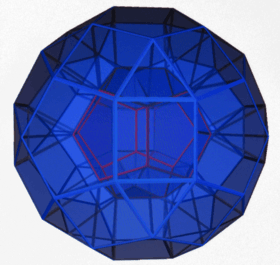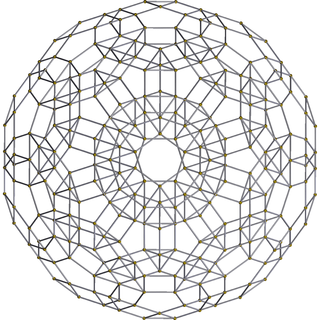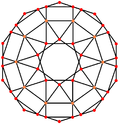Dodecahedral cupola
In 4-dimensional geometry, the dodecagonal cupola is a polychoron bounded by a rhombicosidodecahedron, a parallel dodecahedron, connected by 30 triangular prisms, 12 pentagonal prisms, and 20 tetrahedra.[1]
| Dodecahedral cupola | ||
|---|---|---|
 Schlegel diagram | ||
| Type | Polyhedral cupola | |
| Schläfli symbol | {5,3} v rr{5,3} | |
| Cells | 64 | 1 rr{5,3} 1 {5,3} 30 {}×{3} 12 {}×{5} 20 {3,3} |
| Faces | 194 | 80 triangles 90 squares 24 pentagons |
| Edges | 210 | |
| Vertices | 80 | |
| Dual | ||
| Symmetry group | [5,3,1], order 120 | |
| Properties | convex, regular-faced | |
Related polytopes
The dodecahedral cupola can be sliced off from a runcinated 120-cell, on a hyperplane parallel to a dodecahedral cell. The cupola can be seen in a pentagonal centered orthogonal projection of the runcinated 120-cell:
Runcinated 120-cell |
Dodecahedron (cupola top) |
Rhombicosidodecahedron (cupola base) |
gollark: Most rural areas, like where I am, only have VDSL lines from BT.
gollark: > do people have these problems in other countries?In the UK, we have *different* problems.
gollark: Meh, I turn that off anyway because it seems to be more "Microsoft-approved boot" than *secure* boot. Unless you bother to set your own keys, I guess.
gollark: No, I did, several times.> The data/body can be large, contain arbitrary bytes, and is actually meant to store large amounts of data.> - servers may allocate limited-sized buffers for incoming request headers so you can't put too much in them (this is somewhat problematic for cookies)> request bodies can probably be handled more performantly because of stuff like the length field on them> - request bodies are generated by forms and all sane clients so stuff is mostly designed to deal with those
gollark: I did say multiple times why that's not really a good idea.
See also
References
- Convex Segmentochora Dr. Richard Klitzing, Symmetry: Culture and Science, Vol. 11, Nos. 1-4, 139-181, 2000 (4.152 dodecahedron || rhombicosidodecahedron)
External links
This article is issued from Wikipedia. The text is licensed under Creative Commons - Attribution - Sharealike. Additional terms may apply for the media files.